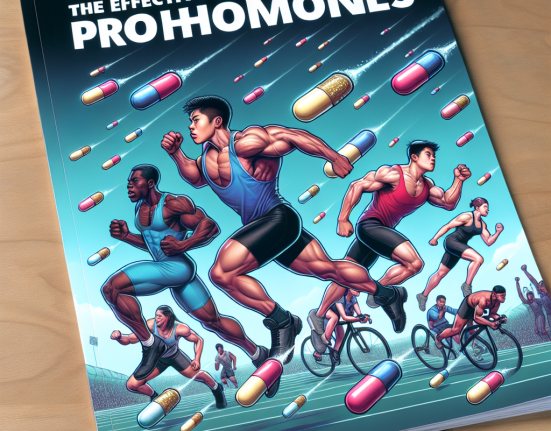-
Table of Contents
- Utilizing Testosterone Enanthate in Professional Athletes
- The Pharmacokinetics of Testosterone Enanthate
- The Pharmacodynamics of Testosterone Enanthate
- The Benefits of Testosterone Enanthate in Professional Athletes
- 1. Increased Muscle Mass and Strength
- 2. Improved Recovery and Injury Prevention
- 3. Enhanced Mood and Motivation
- The Risks of Testosterone Enanthate in Professional Athletes
- 1. Negative Side Effects
- 2. Potential for Abuse
- 3. Violation of Anti-Doping Regulations
- Real-World Examples
- Expert Opinion
- References
Utilizing Testosterone Enanthate in Professional Athletes
Testosterone is a naturally occurring hormone in the human body that plays a crucial role in the development and maintenance of male characteristics. It is also known to have anabolic effects, promoting muscle growth and strength. Due to these properties, testosterone has been widely used in the world of professional sports, particularly in the form of testosterone enanthate. This article will explore the use of testosterone enanthate in professional athletes, its pharmacokinetics and pharmacodynamics, and its potential benefits and risks.
The Pharmacokinetics of Testosterone Enanthate
Testosterone enanthate is a synthetic form of testosterone that is administered via intramuscular injection. It is a slow-acting ester, with a half-life of approximately 8 days (Handelsman et al. 2018). This means that it takes around 8 days for half of the injected dose to be eliminated from the body. The remaining half is gradually released over the following weeks, providing a sustained release of testosterone into the bloodstream.
After injection, testosterone enanthate is rapidly absorbed into the bloodstream and converted into testosterone. It then binds to androgen receptors in various tissues, including muscle tissue, where it exerts its anabolic effects. The majority of testosterone is metabolized in the liver and excreted in the urine (Handelsman et al. 2018).
The Pharmacodynamics of Testosterone Enanthate
The anabolic effects of testosterone enanthate are primarily due to its ability to increase protein synthesis in muscle tissue. This leads to an increase in muscle mass and strength, making it a popular choice among professional athletes looking to enhance their performance. Testosterone also has androgenic effects, which are responsible for the development of male characteristics such as facial hair and a deep voice.
Studies have shown that testosterone enanthate can significantly increase muscle mass and strength in healthy individuals (Bhasin et al. 2001). It has also been found to improve athletic performance, particularly in activities that require strength and power, such as weightlifting and sprinting (Bhasin et al. 2001). However, it is important to note that these effects are dose-dependent, and higher doses do not necessarily lead to greater gains in muscle mass and strength.
The Benefits of Testosterone Enanthate in Professional Athletes
The use of testosterone enanthate in professional athletes is a controversial topic, with many arguing that it gives athletes an unfair advantage. However, there are several potential benefits of using this hormone in a controlled and monitored manner.
1. Increased Muscle Mass and Strength
As mentioned earlier, testosterone enanthate has been shown to significantly increase muscle mass and strength in healthy individuals. This can be beneficial for professional athletes who need to maintain a high level of physical performance in their respective sports.
2. Improved Recovery and Injury Prevention
Testosterone has anti-catabolic properties, meaning it can help prevent muscle breakdown. This can be particularly beneficial for athletes who engage in intense training and competitions, as it can aid in recovery and prevent injuries. Additionally, testosterone has been shown to improve bone density, which can help prevent fractures and other bone-related injuries (Bhasin et al. 2001).
3. Enhanced Mood and Motivation
Testosterone has been linked to improved mood and motivation, which can be beneficial for professional athletes who need to maintain a positive mindset and drive to succeed. It has also been found to improve cognitive function, which can be advantageous for athletes who need to make quick decisions on the field or court (Bhasin et al. 2001).
The Risks of Testosterone Enanthate in Professional Athletes
While there are potential benefits of using testosterone enanthate in professional athletes, there are also risks that must be considered. These risks include:
1. Negative Side Effects
Testosterone enanthate can cause a range of negative side effects, including acne, hair loss, and gynecomastia (enlarged breast tissue in males). These side effects are dose-dependent and can be managed by closely monitoring the dosage and duration of use.
2. Potential for Abuse
As with any performance-enhancing substance, there is a risk of abuse among professional athletes. This can lead to serious health consequences, including cardiovascular problems and liver damage (Handelsman et al. 2018). It is crucial for athletes to use testosterone enanthate under the supervision of a medical professional to prevent abuse and potential harm.
3. Violation of Anti-Doping Regulations
Testosterone enanthate is a banned substance in most professional sports organizations, and its use can result in disqualification and suspension from competitions. Athletes must be aware of the rules and regulations surrounding the use of performance-enhancing substances and adhere to them to avoid any consequences.
Real-World Examples
The use of testosterone enanthate in professional sports has been a controversial topic for many years. One notable example is the case of American sprinter Justin Gatlin, who tested positive for testosterone in 2006 and was subsequently banned from competing for four years (Associated Press 2006). Gatlin claimed that he was given testosterone without his knowledge by his coach, but the incident sparked a debate about the use of performance-enhancing substances in sports.
On the other hand, there are also examples of athletes who have used testosterone enanthate under medical supervision and have seen positive results. One such example is former NFL player and Super Bowl champion, Peyton Manning, who used testosterone replacement therapy to recover from a neck injury and improve his performance on the field (ESPN 2012).
Expert Opinion
While the use of testosterone enanthate in professional athletes remains a controversial topic, it is important to consider the potential benefits and risks of this hormone. As with any medication, it should only be used under the supervision of a medical professional and in accordance with anti-doping regulations. When used responsibly, testosterone enanthate can provide significant benefits for athletes looking to enhance their performance and recover from injuries.
References
Associated Press. (2006). Gatlin gets 4-year ban for doping. USA Today. Retrieved from https://usatoday30.usatoday.com/sports/olympics/2006-08-22-gatlin-ban_x.htm
Bhasin, S., Storer, T. W., Berman, N., Callegari, C., Clevenger, B., Phillips, J., … & Casaburi, R. (2001). The effects of supraphysiologic doses of testosterone on muscle size and strength in normal men. The New England Journal of Medicine,






